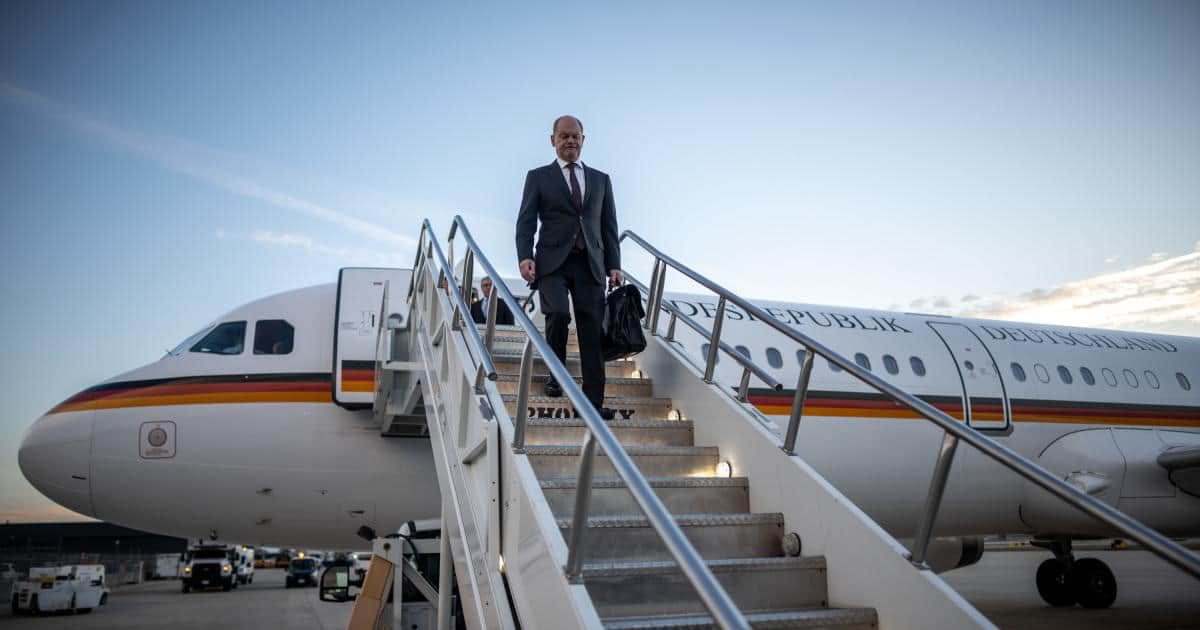How Scholz promoted aid to Ukraine in US

German Chancellor Olaf Scholz, who has recently become the main advocate for military aid to Ukraine, visited the United States at the end of last week. He used the working trip to discuss the current main issue of bilateral relations, the continuation of aid to Ukraine, in meetings with representatives of the US Senate and President Joe Biden. Read more about his efforts in the USA in the article by Khrystyna Bondareva, a European Pravda journalist - To save aid to Ukraine: how Olaf Scholz persuaded USA to restore aid to Kyiv.
Olaf Scholz's role during the full-scale invasion of Russia of Ukraine has became obvious: in matters of military aid to Kyiv, the German Chancellor considered coordination with the United States particularly important. He often looked towards US's position. US leadership was a support for Berlin, a sign that the opposition to Russian aggression at the international level was unwavering. When it became clear that passing a multi-billion dollar package for Ukraine in the US Congress would not be an easy walk, if it even remained off the table, everything changed.
Berlin realised that leadership - not really desirable - could pass to them. Although Germany, the EU's leading economy, doubled military aid to Kyiv for this year to over 7 billion euros, Chancellor Scholz publicly hinted that his country "cannot handle" everything alone. Scholz considers reducing the US role of in military and other aid to Ukraine as an extremely undesirable scenario, realising all the risks.
So, his messages was addressed to Republicans ahead of his visit to the USA. Scholz published a guest article in The Wall Street Journal, preparing for the trip, mainly read by business-oriented Republicans. "Our message is clear: We have to do our utmost to prevent Russia from winning.
If we don't, we might soon wake up in a world even more unstable, threatening and unpredictable than it was during the Cold War," the Chancellor of Germany wrote. It is quite natural that one of the main points on Scholz's US agenda, where he spent less than 24 hours, was a reception at the German Embassy for eight high-ranking American senators - four from the Democratic and Republican parties. Scholz did not come empty-handed to the meeting, but with an EU decision to allocate 50 billion euros to Ukraine over the next four years, which the Chancellor actively advocated for.
Scholz had previously expressed hope that this "Ukrainian" EU decision could facilitate successful voting in Congress. How convincing his arguments were for the senators is not known for sure. However, recounting the discussions, the chancellor expressed confidence that "those dealing with foreign policy and security issues" in the US Congress understand the importance of providing assistance to Kyiv.
Now the chancellor wants to meet with other US politicians at the Munich Security Conference this week. But the key negotiations were still Olaf Scholz's talks with the President of the United States. The negotiations, initially scheduled for an hour, lasted 100 minutes.
Although the leaders' agreements remained behind closed doors, apparently, they discussed that the battle for assistance to Ukraine would not be easy. The German Chancellor, no matter how strong his desire to influence US domestic policy, is not the person who has a significant impact on Congress decisions. Instead, such influence apparently belongs to Donald Trump, whose supporters, Trumpists, it seems, do not intend to give Biden any victories before the elections - even on such a critical issue as Ukraine.
Yes, the procedural decision on Ukraine was successful in the Senate. There are hopes for further success in the House of Representatives, but no one can guarantee anything. But there is also the most undesirable scenario, under which Donald Trump will become the President of the United States again.
And it threatens complete uncertainty not only regarding aid to Kyiv but also the readiness of the United States to defend NATO allies in case of potential Russian aggression.
If you notice an error, select the required text and press Ctrl + Enter to report it to the editors.